30 Jul 2014
Is Alcohol Ruining Your Relationships?
You don’t need to be an alcoholic to have a problem with alcohol. Many people still believe that raging alcoholics are the only people who abuse alcohol. There are many signs that indicate you may have a problem, and one of the biggest is the way in which drinking effects your relationships. Whether it’s with your kids, spouse, parents or anyone else important to you, if alcohol is negatively impacting your relationships with other people, you have a problem.
Relationship Problems Signal Alcohol Abuse
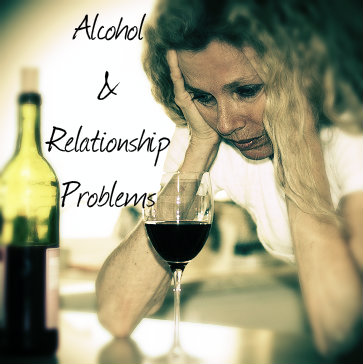 Having a problem with alcohol does not look the same from one person to the next. There are varying degrees, from the initial stages of abuse to full-blown non-functioning alcoholic. If you are questioning your relationship with alcohol, you should be aware of the signs of abuse. One of the most obvious ones is continuing to drink in spite of problems it creates in your relationships. Maybe you and your spouse only fight when you’re drunk. Or, you forget to pick your kids up from activities because you’re out at the bar with friends. Whatever it is, if drinking is at the root of a problem in one of your relationships, you are abusing alcohol.
Having a problem with alcohol does not look the same from one person to the next. There are varying degrees, from the initial stages of abuse to full-blown non-functioning alcoholic. If you are questioning your relationship with alcohol, you should be aware of the signs of abuse. One of the most obvious ones is continuing to drink in spite of problems it creates in your relationships. Maybe you and your spouse only fight when you’re drunk. Or, you forget to pick your kids up from activities because you’re out at the bar with friends. Whatever it is, if drinking is at the root of a problem in one of your relationships, you are abusing alcohol.
Alcohol Makes You Argue
One of the things many of us like about drinking is that it makes us feel bolder. Alcohol works in the brain to lower inhibitions, which is why you may feel more inclined to speak your mind when you’ve been drinking. An argument you would never start when sober often feels right when you’re tipsy. Arguing on a regular basis, especially unfruitful arguments fueled by alcohol, is not good for any relationship. Furthermore, many people also get aggressive when drinking. If you are normally a peaceful person but you feel angry when you drink, the people you care about around you are the ones who will suffer from your wrath.
Alcohol Takes Priority in Your Life
Constant arguing is bad for your relationships, but so is neglect. Another common relationship problem fueled by drinking is misplacement of priorities. If your spouse feels neglected because you would rather go out drinking with buddies, you are placing alcohol ahead of her on your list. The same can often happen with kids. Did you miss a school event or a soccer game because you were too drunk to get there? Your children can feel as if they are unimportant to you, which will have a terrible impact on your relationship with them.
You Deny Having a Problem
When your loved ones approach you to discuss your drinking and how it impacts them, do you brush it off? Do you refuse to admit the effect alcohol is having on your life and relationships? If so, this can further exacerbate the issue. If you can admit to the problem and agree to take steps to correct it, your loved ones will most likely support you. On the other hand, if you continue to deny the problem, you will only further damage your relationships. No change can happen until you open your eyes and see what alcohol has done to the relationships you have with the people you care about.
Your drinking may have already trashed any number of relationships in your life, but take away something positive from this. If you can take a step back and see what impact alcohol has had, you are in a position to make changes before it gets worse. Before you succumb to the disease of alcoholism, you can take steps now to turn your life around. Slow or stop your drinking, repair your relationships and move on with your life.
Learn More About The Link Between Alcoholism And Substance Abuse Among Women With Bipolar Disorder
IF YOU OR SOMEONE YOU LOVE IS STRUGGLING WITH ALCOHOL – PICK UP THE PHONE AND CALL US NOW – HEALING AND PEACE CAN BE YOURS TODAY!
22 Jul 2014
Why Do Heavy Drinkers Have A Lower Adherence To Naltrexone/Cognitive Behavioral Therapy?
Treatment programs for people affected by alcoholism commonly feature medications, some form of counseling or psychotherapy, or a combination of medication and counseling or psychotherapy. Together, a medication called naltrexone and a form of therapy called cognitive behavioral therapy have been shown to produce beneficial results in controlled testing. In a study published in March 2014 in The American Journal of Drug and Alcohol Abuse, researchers from two Finnish institutions sought to determine if the naltrexone/cognitive behavioral therapy combination works as well in a less controlled setting that mimics a typical treatment environment.
What Is Naltrexone And How Does It Work?
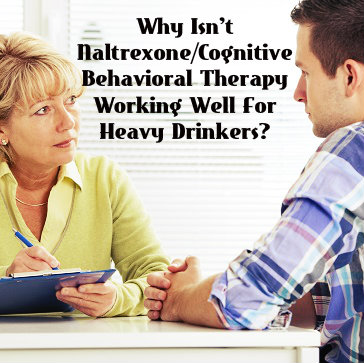 Naltrexone is a medication that blocks access to sites, called opioid receptors, located on nerves in both the brain and certain parts of the body. When used in a person addicted to opioid substances of abuse, this blocking action prevents the characteristic “high” associated with narcotics. For reasons that researchers and doctors don’t fully understand, the same blocking action helps reduce the amount of pleasure derived from alcohol consumption, in addition to decreasing the intensity of any urges to drink more alcohol.
Naltrexone is a medication that blocks access to sites, called opioid receptors, located on nerves in both the brain and certain parts of the body. When used in a person addicted to opioid substances of abuse, this blocking action prevents the characteristic “high” associated with narcotics. For reasons that researchers and doctors don’t fully understand, the same blocking action helps reduce the amount of pleasure derived from alcohol consumption, in addition to decreasing the intensity of any urges to drink more alcohol.
Together, these effects can help a person in recovery from alcoholism avoid relapsing back into a pattern of active drinking. As a rule, doctors give the medication only to recovering alcoholics who have entirely or largely halted their alcohol intake; doctors also typically use naltrexone as part of an overall treatment approach rather than as a sole component in treatment. The medication comes in forms that include tablets and an extended-release injection.
Cognitive Behavioral Therapy
Cognitive behavioral therapy is the umbrella term for a group of therapeutic approaches that focus on helping patients/clients identify and change thoughts and beliefs that can contribute to a range of harmful behaviors, including the abuse of alcohol and/or drugs.
Specific approaches that fall under this umbrella include rational behavior therapy, dialectic behavior therapy and rational emotive behavior therapy. Cognitive behavioral therapy takes place in a limited timespan that usually lasts for about four months. Unlike some forms of psychotherapy that maintain a strict hierarchy between the therapist and patient/client, it features a shared process that calls on the patient/client to take an active role in achieving his or her treatment objectives. The objectives for any given individual are specific to his or her particular situation and self-perceived needs and wants.
Does The Combination Of Naltrexone And Cognitive Behavioral Therapy Work For Alcoholism?
In the study published in The American Journal of Drug and Alcohol Abuse, researchers from Finland’s University of Helsinki and National Institute for Health and Welfare assessed the usefulness of the naltrexone/cognitive behavioral therapy combination as a treatment for alcoholism in a real-world environment. They chose this line of inquiry, in part, because of the relative lack of information on the combination in people actively receiving treatment outside of a controlled, experimental setting. During the study, the researchers gathered data from 315 outpatients receiving both naltrexone and cognitive behavioral therapy for a 20-week period. Measurements of treatment success included relative levels of alcohol intake and relative levels of alcohol craving among the participants.
After completing their analysis of the treatment outcomes, the researchers concluded that the naltrexone/cognitive behavioral therapy combination does not work equally well for all people recovering from alcoholism. Those individuals most likely to benefit from naltrexone and cognitive behavioral therapy were people who consumed relatively small amounts of alcohol before entering treatment. Conversely, the individuals least likely to benefit from the combination drank relatively heavily before entering recovery, had never been in a recovery program before and had a fixed pattern of alcohol consumption before entering treatment.
When Naltrexone And Cognitive Behavioral Therapy Works Best
The authors of the study published in The American Journal of Drug and Alcohol Abuse note that, strictly speaking, the combination of naltrexone and cognitive behavioral therapy did not fail to produce good results.
Instead, those individuals who fared poorly often did not take their prescribed doses of the medication, especially when they continued to engage in significant amounts of drinking while taking part in treatment. The authors believe that the fairly low rate of compliance with naltrexone use may pose a serious concern for the real-world treatment of alcoholism, especially among severely affected alcoholics.
Consequently, they also believe that alcohol programs may need to use a more comprehensive set of treatment options in order to help heavily affected alcoholics improve while in recovery. On a related note, doctors can use the extended-release, injectable form of naltrexone (Vivitrol) to overcome some of the problems with medication compliance.
Read Our Other Alcoholism Treatment Posts
18 Jul 2014
How To Stop Drinking When You Become Pregnant
Every mother-to-be wants the best for her future child, but when you struggle with drinking that means making a big sacrifice. If you drink a lot and have wondered if you have a drinking problem, and suddenly find out you’re pregnant, it’s like a big and important wake-up call. Now is your chance to get sober and do what is best for you and your baby.
Have I Already Hurt My Baby With Drinking?
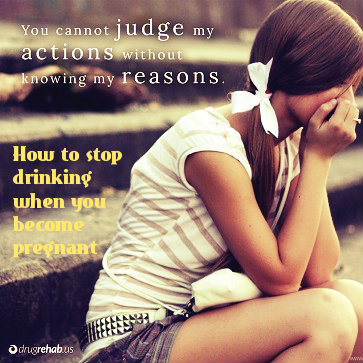 Many women who get pregnant without having planned for it worry that they have already caused harm by drinking during their early stages of pregnancy. While it is best to not be drinking at all, the most important thing is to stop drinking as soon as you find out. Not all experts agree on just how much alcohol can cause harm to a fetus, but the first few weeks are a time of rapid development. That being said, many women do go on to give birth to perfectly healthy babies.
Many women who get pregnant without having planned for it worry that they have already caused harm by drinking during their early stages of pregnancy. While it is best to not be drinking at all, the most important thing is to stop drinking as soon as you find out. Not all experts agree on just how much alcohol can cause harm to a fetus, but the first few weeks are a time of rapid development. That being said, many women do go on to give birth to perfectly healthy babies.
The real issue is what can happen if you continue to drink throughout your pregnancy. Any amount of alcohol can impact your child and cause fetal alcohol spectrum disorders. These are preventable illnesses that produce a variety of symptoms in a child whose mother drank during pregnancy. Possible symptoms include unusual facial features, low body weight and small size, poor coordination, hyperactivity, learning disabilities, delays in developing speech and language skills, sleep difficulties, vision and hearing problems, and even organ damage.
How Do I Stop Drinking?
There is no point in feeling guilty about having already consumed alcohol while pregnant. Now is the time to cut yourself off completely, no matter how difficult that may be. Of course if you feel you can’t do it, no matter the risk to your child, turn to addiction professionals to help you get sober and monitor both your health and that of your baby.
If, on the other hand, your problem is not that severe, there are some steps you can take to make giving up alcohol a little easier. First, associate and socialize more with people who don’t drink or in situations where there will be no alcohol. Going to parties where everyone is drinking will make quitting much more difficult.
Learn how to make fantastic virgin drinks. Cocktails are huge right now and there is no reason you can’t join in on the trend. There are plenty of resources available to help you find recipes for delicious mocktails. Or, get creative and come up with your own recipes.
If drinking has been a habit that helps you relax and unwind at the end of the day, replace it with a healthier way to de-stress. Exercise is a wonderful way to relax, and also for you and your baby to stay healthy. Just be sure that you keep your doctor in the loop in case certain types of exercise should be avoided. You can also relax by engaging in a hobby, reading a good book, taking a nice long bath or by meditating.
Giving up alcohol for the health and safety of your baby may be the most important thing you ever do. It won’t be easy if you have made a habit of drinking too much or regularly, but it is doable. Just remember that if you really struggle to get on the wagon, professionals are available to help you.
Learn More – Why Do Women Continue To Drink During Pregnancy?
If You Need Help With An Addiction, Call Us Now – We Are Available For You 24/7
Addiction researchers know that alcohol produces some of its effects inside the brain by activating sites called opioid receptors, found on the surfaces of nerve cells. However, they don’t completely understand the brain’s opioid receptor system, and therefore don’t entirely know how activation or deactivation of this system can help or harm a person who drinks excessive amounts of alcohol.
In a study published in May 2014 in the journal Biological Psychiatry, a team of U.S. and Danish researchers explored the alcoholism-related role of one specific part of the brain’s opioid receptor system. The researchers concluded that successful manipulation of this segment of the system could lead to the development of a new family of alcoholism medications.
Alcoholism Symptoms
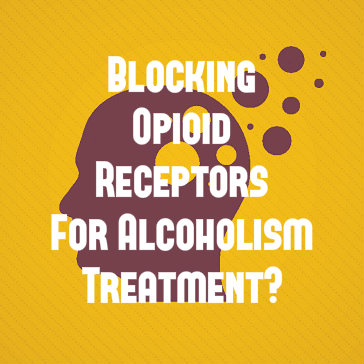 Alcoholism is partially defined by a physical dependence, a switch in long-term brain function characterized by a need to regularly consume alcohol in order to feel “normal.” In addition, people with the condition experience symptoms stemming largely from dependence, including recurring urges to keep drinking, an impaired or absent ability to limit drinking participation, increasing tolerance to the impact of any given amount of alcohol intake and the onset of a withdrawal syndrome if the brain’s requirements for alcohol go unmet.
Alcoholism is partially defined by a physical dependence, a switch in long-term brain function characterized by a need to regularly consume alcohol in order to feel “normal.” In addition, people with the condition experience symptoms stemming largely from dependence, including recurring urges to keep drinking, an impaired or absent ability to limit drinking participation, increasing tolerance to the impact of any given amount of alcohol intake and the onset of a withdrawal syndrome if the brain’s requirements for alcohol go unmet.
Alcohol Use Disorder
In any person, the symptoms of physically dependent alcoholism can overlap with the symptoms of non-dependent alcohol abuse. For this reason, current standards in the U.S. ask doctors to diagnose both alcoholism and alcohol abuse as components of a condition called alcohol use disorder.
Alcohol and Opioid Receptors
Opioid receptors get their name because they act as the pathways that allow opioid drugs and medications in the bloodstream to gain access to the brain and spinal cord (central nervous system). There are several types of these receptors on nerve cell surfaces in the brain. For reasons not fully understood by experts in the field, opioid receptors also play a role in giving alcohol access to the brain.
Pharmaceutical researchers have begun to exploit this fact by developing alcoholism medications designed to produce their treatment benefits by occupying the brain’s opioid receptors and thereby blocking alcohol from triggering some of its characteristic effects. One specific medication currently approved in the U.S. for use in alcoholism treatment, called naltrexone (ReVia, Vivitrol), blocks a particular type of opioid receptor and reduces alcohol cravings by diminishing the amount of pleasure derived from alcohol intake.
New Alcoholism Treatments?
In the study published in Biological Psychiatry, researchers from Washington State University and Denmark’s Neuroscience Drug Discovery used laboratory experiments on rats to investigate the role of one specific type of opioid receptor, called the K opioid receptor, in promoting the onset and continuation of alcoholism.
They chose to explore this topic, in part, in response to accumulating evidence that the K opioid receptor helps determine how people react to excessive alcohol intake. In particular, when a person drinks too much alcohol, activation of this receptor may lead to unpleasant emotional states and loss of the ability to feel pleasure. Counterintuitively, this situation may in turn trigger additional drinking as part of a conscious or unconscious attempt to offset the negative feelings associated with alcohol consumption.
During the study, the researchers supplied large amounts of alcohol to a group of rats for an extended period of time, and then allowed those rats to go through alcohol withdrawal. After examining the rats’ brains, they concluded that long-term, excessive alcohol consumption seriously disrupts function in a part of the brain responsible for helping to maintain critical functions, such as the ability to process emotions and make decisions.
While the rats were going through withdrawal, the researchers gave them a number of drugs designed to manipulate their brains’ K opioid receptors. After analyzing the impact of these drugs, they concluded that problems with the K opioid receptors play a significant role in producing the heavy alcohol consumption that people with alcoholism commonly rely on to cancel out alcohol withdrawal symptoms.
The study’s authors believe their findings may be critically important for the development of future medical treatments for alcoholism that produce their benefits by blocking access to the brain’s K opioid receptors. Specifically, they believe that such treatments could help achieve such goals as diminishing the emotional impact of alcohol withdrawal, helping people in recovery establish a stable state of abstinence and helping people in recovery otherwise meet the objectives of their treatment programs.
Learn About Topiramate Treatment For Alcoholism
07 Jul 2014
Are Binge Drinkers Addicted To Alcohol?
Binge drinking is a term used to describe heavy drinking. According to the National Institute on Alcohol Abuse and Alcoholism (NIAAA), binge drinking means having enough drinks in a two hour period to achieve a blood alcohol concentration level of 0.08, a level at which a person is considered to be intoxicated. Binge drinking is increasingly common, but does it make a person an alcoholic or addicted to alcohol? The answer is not so simple.
The Risks Of Binge Drinking
For women, binge drinking typically means having four or more drinks in a two-hour period. For men, it means having five or more drinks. Consuming this much alcohol in one sitting, or more, is detrimental to your health. And if you drink this way, you are not alone. One in every six adults in the U.S. binges four times a month. Each binge includes eight drinks on average. This is a lot of alcohol.
Binge drinking can lead to a number of health problems, not least of which is dependence on alcohol, or alcoholism. It can also cause:
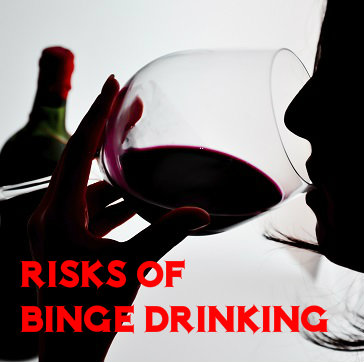 liver disease
liver disease- high blood pressure
- heart attack
- stroke
- neurological damage
- complications if you have diabetes
Binge drinking also leads to:
- accidents and injuries
- alcohol poisoning
- fetal alcohol syndrome
- unintended pregnancies
- problems with relationships
- strain on career and finances
What Is Alcoholism?
So does binge drinking make you an alcoholic? Not necessarily. Addictive disorders are most often diagnosed based on the Diagnostic and Statistical Manual of Mental Disorders. The fifth version of this manual recently came out with new criteria for alcohol addiction. The fourth edition listed alcohol abuse and alcohol dependence (alcoholism) as two separate disorders. The fifth edition merged the two into one disorder: alcohol use disorder. A person can be diagnosed as having a mild, moderate or severe case of alcohol use disorder.
According to the fifth edition, to have an alcohol use disorder you must have two of the eleven symptoms listed in the manual. Having two or three symptoms represents a mild case. Binge drinking is not listed as a symptom, but several of the symptoms could result from binge drinking. For instance, one symptom is drinking more than you intended to on a particular occasion. Many binge drinkers could claim doing this. Another symptom is trying to drink less, but failing. Again, this can happen with binge drinking.
There are several other symptoms that could go hand-in-hand with binge drinking. This means that if you binge drink and end up having two of these symptoms, you could be diagnosed as having mild alcohol use disorder. If the risks of binge drinking are not enough to make you want to slow down, maybe this fact is.
Stopping Binge Drinking
Moderate drinking is not harmful to your health, unless you have specific conditions that are exacerbated by alcohol. If you binge drink regularly, consider cutting back to moderate drinking levels. If you don’t, you put yourself at risk for a number of health problems. Not least of these is alcohol use disorder. If you could qualify for a diagnosis of mild now, you are on the path to having moderate or severe alcohol use disorder later.
Being a moderate drinker means having no more than three drinks per day and seven per week if you are a woman. If you are a man, have no more than four drinks per day and 14 in a week. Cutting back is important for your health, but if you find you can’t, you may need to get help. Rely on friends and family to support you in drinking less, or find a support group to join. You don’t need to be a full-blown alcoholic to ask for help. Doing so now could save you disastrous consequences in the future.
If You Or Someone You Love Needs Help Quitting Drinking – Call Us Now – We Will Get You On The Path To Happy And Healthy Sobriety!
Medication commonly plays an important role in the effective treatment of alcoholism (one of the two overlapping conditions that constitute alcohol use disorder). Some of the medication options in use were specifically designed to help people affected by problematic alcohol use, while others were originally designed for the treatment of non-alcohol-related health concerns.
In a study published in April 2014 in The American Journal of Drug and Alcohol Abuse, researchers from the Boston University School of Medicine explored the potential usefulness of an anti-seizure medication called ezogabine or retigabine as a treatment for people diagnosed with alcoholism.
Medications For Alcoholism Treatment
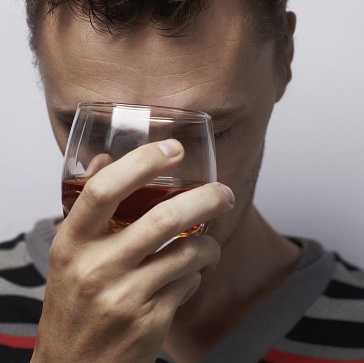 Doctors have four main medication options for helping people affected by alcoholism. Two of these options, disulfiram (Antabuse) and acamprosate (Campral), were developed primarily for alcohol-related treatment. Pharmaceutical researchers initially developed the third option, naltrexone (ReVia, Vivitrol), as a treatment for people diagnosed with opioid addiction. The fourth option, topiramate (Topamax), was originally intended to help individuals affected by certain types of seizure disorders.
Doctors have four main medication options for helping people affected by alcoholism. Two of these options, disulfiram (Antabuse) and acamprosate (Campral), were developed primarily for alcohol-related treatment. Pharmaceutical researchers initially developed the third option, naltrexone (ReVia, Vivitrol), as a treatment for people diagnosed with opioid addiction. The fourth option, topiramate (Topamax), was originally intended to help individuals affected by certain types of seizure disorders.
The U.S. Food and Drug Administration has officially approved disulfiram, acamprosate and naltrexone as alcoholism treatments. The FDA has not approved topiramate for alcoholism treatment; however, doctors can still prescribe this medication as an unofficial or “off-label” option.
Unique Results
Each of the current medication options for alcoholism produces results in its own distinct way. For example, disulfiram deters drinking by slowing down the body’s ability to process alcohol and sharply exaggerating the unpleasant symptoms associated with excessive alcohol consumption. Acamprosate helps ease some of the worst symptoms of alcohol withdrawal by making certain changes in the brain’s chemical balance.
Naltrexone helps block the nerve receptors that normally give opioid narcotic substances access to the brain; for reasons that are not entirely clear, this action also interferes with the pleasure derived from alcohol consumption and reduces the strength of cravings for more alcohol intake. Topiramate helps reduce any overactivity in the brain’s nerve cells; although no one really knows why, this reduction also diminishes the strength of alcohol cravings and helps lower the risks for participation in excessive drinking.
Outside of the U.S., ezogabine is also commonly known as retigabine. Its brand name within the U.S. is Protiga. Like topiramate, ezogabine belongs to a group of medications called anti-seizure medications or anticonvulsants. Doctors typically use the medication as part of a larger course of treatment for adults affected by seizures called partial onset seizures, which remain localized in one part of the brain rather than branching out and producing more widespread effects. Ezogabine comes in tablet form.
Ezogabine In Alcoholism Treatment
In the study published in The American Journal of Drug and Alcohol Abuse, the researchers from the Boston University School of Medicine used laboratory experiments on rats to investigate the usefulness of ezogabine (retigabine) as a treatment for alcoholism. These researchers had previously explored the potential usefulness of other types of anti-seizure medications and chose to focus on ezogabine because the medication works in a fairly unique way inside the brain.
During the study, the researchers gave ezogabine to two groups of rats for three days. One of these groups had access to a 10 percent solution of pure drinking alcohol, while the other group had access to a 5 percent alcohol solution. A comparison group of rats received a placebo instead of ezogabine. After comparing the outcomes in the three groups, the researchers concluded that the rats given ezogabine significantly reduced their alcohol intake over the course of the study.
The authors note that the therapeutic dose of ezogabine given to the rats in the project was quite close to the dose capable of producing an unwanted loss of muscle control. This means that, in human beings, the amount of the medication needed to help recovering alcoholics curb their drinking may not differ much from the amount capable of causing harm. Citing this finding, the study’s authors call for more research to investigate the specific effects that ezogabine has inside the central nervous system (brain and spinal cord). In addition, they feel that their ezogabine-related work can play an important role in the search for other medications that work in a similar way and may ultimately provide unique benefits in alcoholism treatment.
Call Us Now For Alcohol Abuse Help! We Are Here For You 24/7!
The phrase older and wiser suggests that as a person ages they learn a lot about how to deal with life. Experience is a profound teacher. However, it’s also true that as a person enters their golden years they are entering new territory. The retirement years are full of all kinds of changes and challenges. Sometimes there are so many of them that seniors are left scrambling for a way to cope.
Older People And Life Challenges That Effect Drug Abuse
 The American Geriatrics Society reports that older adults may be more apt than others to form a substance addiction by virtue of the many life challenges they encounter. Loneliness, grief, lack of purpose, boredom and chronic pain confront seniors with full force. As many as 20 percent of senior citizens msuse or abuse their prescription drugs or alcohol.
The American Geriatrics Society reports that older adults may be more apt than others to form a substance addiction by virtue of the many life challenges they encounter. Loneliness, grief, lack of purpose, boredom and chronic pain confront seniors with full force. As many as 20 percent of senior citizens msuse or abuse their prescription drugs or alcohol.
Alcohol – Most Abused Substance By Seniors
The substance most often abused by seniors is alcohol, with 60 percent of addiction treatment admittances for older adults relating to alcohol use. According to the Substance Abuse and Mental Health Administration (SAMHSA), 5.5 million seniors struggle with an alcohol use problem. This is in part because alcohol is a socially acceptable mode of self-medication.
But for seniors, drinking too much alcohol can have serious consequences. The truth is that alcohol affects older bodies more than younger ones. The senior’s body is slowing down in every way, including metabolism. That means that alcohol is processed much more slowly in an older person’s body. Because of this the National Institute on Alcohol Abuse and Alcoholism recommends that adults age 65 or above consume no more than one alcoholic beverage per day.
Older People Abusing Prescription Drugs
Prescription drugs are another source of potential abuse for seniors. To begin with, senior citizens are prescribed more medication than any other age group of Americans. But just as with alcohol, medications are also metabolized more slowly by older bodies.
Sedatives (barbiturates, diazepam, chlordiazepoxide) used to help older patients sleep are highly addictive. These medications tend to store up in fat deposits which make their effects even longer-lasting in older bodies which typically carry more fat. This is no small problem with the diazepam drug Valium prescribed to 100,000 older Americans annually.
Seniors Abusing Illegal Substances At A Greater Rate?
More people over age 50 are using illegal, illicit drugs. SAMHSA reports that treatment admittances for patients over 50 addicted to illegal drugs doubled and has continued to rise.
The good news in all of this is that when addiction forms late in life, with intervention and treatment there is hope for recovery.
See That There Is Hope For Recovery For YOU!
If You Or Your Elderly Loved One Need Help With Drug Or Alcohol Abuse – Call Us Now – We Are Here To Help!
Addiction specialists and other health professionals have a range of medication-based options for helping people affected by alcoholism. However, even when they receive one of these medications, some recovering alcoholics still lapse back into heavy alcohol consumption. In a study published in April 2014 in the journal Alcoholism: Clinical & Experimental Research, researchers from three German institutions assessed the effectiveness of individualized psychotherapy in recovering alcoholics who don’t respond sufficiently to medication-based treatment. Specifically, the researchers examined the usefulness of a form of individualized therapy called cognitive behavioral therapy.
What Medications Can Help Alcoholics?
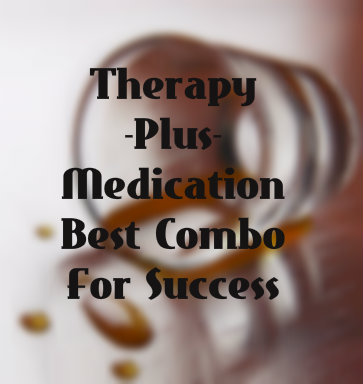 As of 2014, the U.S. Food and Drug Administration has approved a trio of medications for use in people recovering from alcoholism: naltrexone (Vivitrol), disulfiram (Antabuse) and acamprosate (Campral). Naltrexone is an anti-opioid medication that also blocks the chemical reactions responsible for triggering pleasurable sensations and alcohol cravings in drinkers. Disulfiram deters alcohol consumption by exaggerating the unpleasant chemical reactions associated with the breakdown of alcohol inside the body. Acamprosate makes chemical changes inside the brain that typically lessen the intensity of the alcohol withdrawal symptoms that commonly contribute to relapse risks in recovering alcoholics. Doctors also sometimes use a fourth medication, called topiramate (Topamax), not initially intended for use in alcoholism treatment. This anti-seizure compound also makes changes in the brain’s chemical environment that can help lower the odds that recovering alcoholics will take a drink.
As of 2014, the U.S. Food and Drug Administration has approved a trio of medications for use in people recovering from alcoholism: naltrexone (Vivitrol), disulfiram (Antabuse) and acamprosate (Campral). Naltrexone is an anti-opioid medication that also blocks the chemical reactions responsible for triggering pleasurable sensations and alcohol cravings in drinkers. Disulfiram deters alcohol consumption by exaggerating the unpleasant chemical reactions associated with the breakdown of alcohol inside the body. Acamprosate makes chemical changes inside the brain that typically lessen the intensity of the alcohol withdrawal symptoms that commonly contribute to relapse risks in recovering alcoholics. Doctors also sometimes use a fourth medication, called topiramate (Topamax), not initially intended for use in alcoholism treatment. This anti-seizure compound also makes changes in the brain’s chemical environment that can help lower the odds that recovering alcoholics will take a drink.
Cognitive Behavioral Therapy
Practitioners of cognitive behavioral therapy (CBT) help their patients/clients identify the underlying feelings, perceptions and actions that contribute to dysfunctional behavior in stressful situations. After making this identification, the individual can gradually learn a new set of feelings, perceptions and actions that don’t help trigger destructive behaviors. In the context of addiction treatment, CBT practitioners specifically help their patients/clients learn to do such things as anticipate the situations likely to increase the urge to use drugs or alcohol, learn how to cope with those situations without using drugs or alcohol, identify substance-using urges as soon as possible and accurately weigh the pros and cons of using drugs or alcohol.
Cognitive behavioral therapy is suitable for use in both individualized and group formats. In addition, the therapy can be used on its own or in combination with medication-based addiction treatment. In addition to alcoholism, forms of addiction addressed by CBT include addiction to the stimulants methamphetamine and cocaine, marijuana addiction and addiction to the nicotine contained in cigarettes and other tobacco products.
Usefulness In People Not Helped By Medication
In the study published in Alcoholism: Clinical & Experimental Research, researchers from Germany’s Freiberg University, Tubingen University and Heidelberg University used an examination of 109 individuals to assess the effectiveness of an individualized cognitive behavioral approach in helping recovering alcoholics who don’t receive enough benefit from medication-based treatment. All of these individuals were alcohol program participants who had experienced severe relapses back into drinking after taking an alcoholism medication, or after receiving a placebo that mimicked the appearance of an alcoholism medication. During the study, half of the participants continued to receive a standard combination of medication and medical symptom management. The other half received a combination of medication, medical symptom management and cognitive behavioral therapy conducted on an individualized basis.
The researchers analyzed the effectiveness of individualized CBT in all of the participants originally assigned to the therapy group, as well as the effectiveness of the approach in all of the participants who actively engaged in therapy. After completing these analyses, they concluded that the recovering alcoholics who actively engaged in the CBT process received a substantial benefit from the therapy and experienced improved treatment outcomes when compared to the recovering alcoholics who received only medication and medical symptom management.
The chief measurement used to compare the effectiveness of the combination of medication and individualized cognitive behavioral therapy to the effectiveness of medication without CBT was the number of days recovering alcoholics could successfully avoid experiencing another severe relapse. The authors of the study published in Alcoholism: Clinical & Experimental Research concluded that those program participants who actively embrace the goals of individualized CBT can potentially increase the number of days between relapses if they combine the therapy with an alcoholism medication. In line with this conclusion, they believe that alcohol programs may see significant improvements in their patients’/clients’ relapse-related outcomes if they offer access to non-medication-based therapy early in the treatment process.
Read How Do Recovering Alcoholics Respond To Baclofen?


